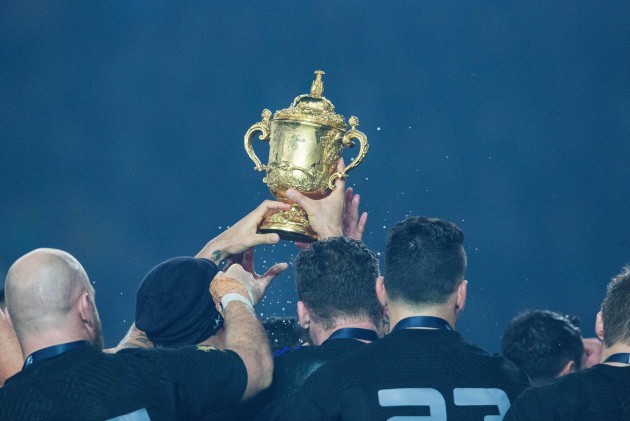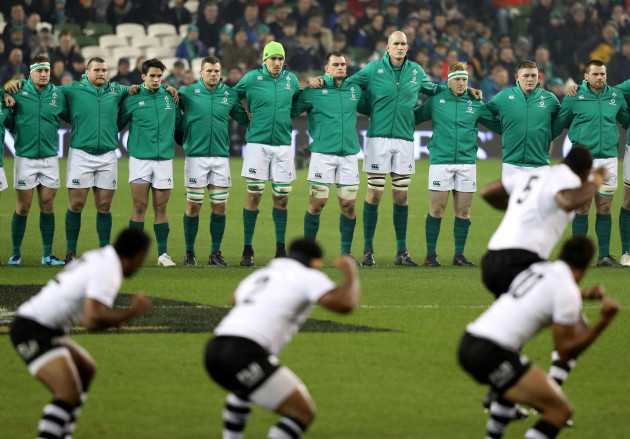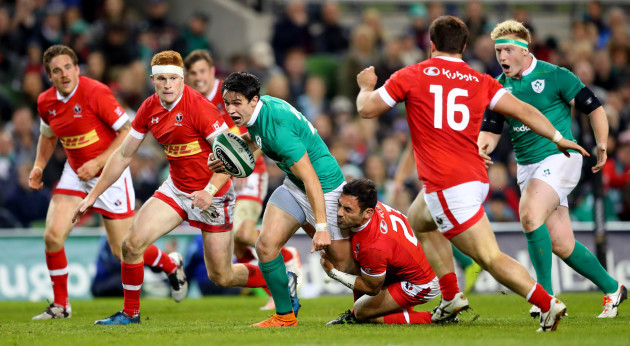THE 2019 WORLD Cup kicks off in one year, but already World Rugby is looking well beyond Japan.
The governing body’s CEO, Brett Gosper, says it’s a case of “when rather than if” the World Cup will expand from 20 to 24 teams in the future.
The expansion could even come as soon as the 2023 World Cup in France, although the 2027 tournament may be a more realistic target for World Rugby.
Listening with interest to Gosper’s words earlier this month was International Rugby Players [IRP], the association representing the interests of rugby players around the world.
Omar Hassanein, the association’s CEO, says IRP is not strictly against the idea of expanding the World Cup, but its belief is that there are more pressing issues around helping tier two nations to become greater forces in the global game.
“From our perspective, we don’t have too strong a position on whether the World Cup should be 20 or 24 teams,” Hassanein told The42.
“The four teams that will just miss out on the World Cup this time are teams we work closely with and represent anyway.
“The thing for us is that there should be a real emphasis on strengthening the existing tier two nations and getting them up to a point where we’re having a World Cup that has more uncertainty.
“In an ideal world, it would be a lot more difficult to determine who the top eight teams are going to be come World Cup quarter-final time.
“In football, countries like Italy are missing out on the World Cup altogether. That’s something to aspire too, even if we’re a different type of sport.”
The Pacific Island nations of Samoa, Fiji and Tonga are chief among IRP’s thoughts, alongside fellow tier two countries such as the US, Canada, Japan, Georgia and Romania.
World Rugby provides a major share of the finance for some of those unions’ operating budgets, but there have been troubling issues regarding player payments in certain places.
The Pacific Island nations have ongoing issues with irregular and non-payments to players, German rugby has suffered from funding withdrawals this year, while Canadian rugby is in turmoil due to a contract dispute, with players unhappy about the manner in which its union is attempting to switch its focus from 7s to 15s.
The Kenya 7s team, meanwhile, almost pulled out of the World Sevens Series after its players were not paid salaries and commercial money due to them for a matter of months, despite repeated promises from their union that the issue would be resolved.
IRP’s belief is that eradicating these issues from the global game should be the priority before World Cup expansion is seriously considered.
“We should be getting our tier two teams a lot stronger and that’s what the emphasis of our recent discussions with World Rugby has been,” said Hassanein.
“It comes through high-performance models but it also comes through basic stuff like making sure the players are paid on time, making sure that the travel is as easy and comfortable as possible.
“World Rugby are on board but it depends how you look at the solution. We feel that directly ensuring that these players get paid is a better mechanism than paying the governing bodies and leaving it to their devices as to whether they pay their players and how they pay their players.
“Ultimately, we live in a world where money dictates a lot and we need to put measures in place which ensure that players have faith in their governing bodies to do the right thing.”
IRP is also keen for tier two nations to get more regular chances to play against tier one countries outside of World Cups.
The ongoing doubts over the new global calendar for 2020 to 2032 are worrying for all involved, but the agreement reached in San Francisco last year for the next decade or so would see a 39% increase in tier one v tier two fixtures.
The hope is that a World Rugby meeting in Sydney next week can push that previously-agreed global calendar through and that tier two nations will benefit.
“Part of it is getting a tier two calendar in place that gives them consistency and meaningful matches,” said Hassanein.
“Unfortunately, the difficulty is that most tier two nations are not necessarily commercial hubs or powerhouses. Bringing big matches to Fiji, Samoa, Romania, whilst it’s romantic, doesn’t generate big funds. Japan is probably the exception – if Japanese rugby can take off, it has strong commercial potential, as does the USA.
“Keeping the players in these countries is something we can control, particularly with the Pacific Islands.
“We need to do everything we can to incentivise players to play with their countries as often as possible and not have reasons to rest themselves or save themselves purely for club rugby. That’s something that we can address by making sure that it’s always attractive to play for your country.”
The42 is on Instagram! Tap the button below on your phone to follow us!



